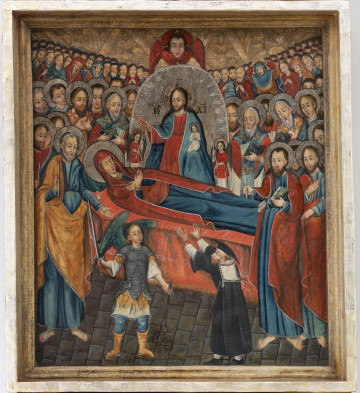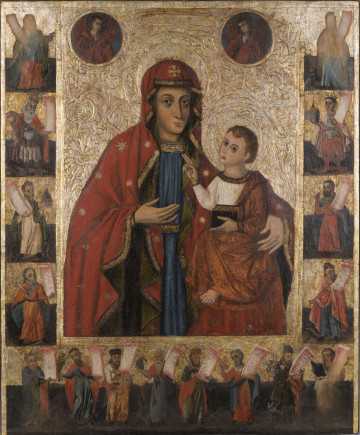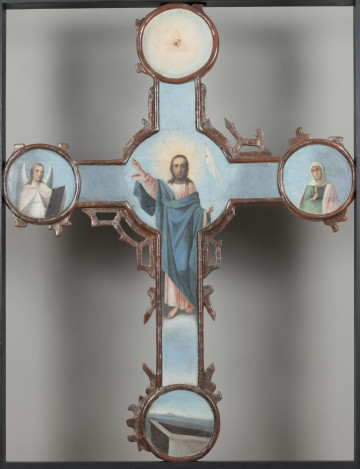
Dormition of Mary
1690 — 1710
National Museum in Lublin
Part of the collection: Icons
The icon of the Dormition of the Mother of God presents the moment of the end of the earthly stage of her life described in the apocrypha. Mary is resting on the bed, behind her Christ is holding her soul on his left shoulder, depicted as an infant in its swaddling clothes. The figure of Jesus is surrounded by a mandorla, the dark green colour of which signifies the impenetrability of God’s mystery. In front of Mary’s bed, an apocryphal scene is depicted: Archangel Michael, shown as a winged warrior in armour, with his sword cuts off the hands of the Jew Jephonis, who wanted to overturn the stretcher of the deceased. There are eleven apostles and a woman gathered around; St. Peter keeps vigil at Mary’s head, and at her feet – St. Paul. In the back you can see a crowd of believers, including bishops and clergy. In the centre of the upper zone, in a mandorla supported by two angels, Mary is depicted once more, surrounded by a radiant glory and raising her hands in praise. On the clouds are the Apostles, each with an accompanying angel. According to tradition, they were brought from different parts of the world, where they preached the Gospel, in order to gather at the moment of Our Lady’s dormition.
What draws attention to the Lublin icon is the decoration of the fabrics adjacent to the statue of Mary. The red cloth covering the deathbed is ornamented with embellishments of far eastern provenance called cintamani, which consists of a repeating motif: two wavy lines and three spheres, symbolising the domination of the three elements of the world – sky, earth and water – as well as strength, victory and glory. The other fabrics are dominated by plant motifs, floral ones in particular. The presentation of flowers in the Marian context can be associated with their general symbolism – a flower as a sign of awakening nature symbolises the hope for resurrection. Flowers can also be a reference to the legend according to which the apostles, when they heard of Mary’s death, went to the place where she was to be buried – but they did not find her body there, only many different flowers.
Author / creator
Dimensions
cały obiekt: height: 76,5 cm, width: 114,5 cm
Object type
painting
Technique
gilding
Material
plank, tempera, gold
Creation time / dating
Creation / finding place
Owner
The National Museum in Lublin
Identification number
Location / status

1690 — 1710
National Museum in Lublin

1750
National Museum in Lublin

1801 — 1900
National Museum in Lublin
DISCOVER this TOPIC
National Museum in Lublin
DISCOVER this PATH
Educational path